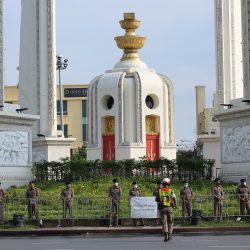Central bank governor says Thai economy does not need bailout from IMF

The Thai economy is strong enough and the country does not need to seek a financial bailout from the International Monetary Fund (IMF), although its GDP this year may be the lowest in the region, Bank of Thailand Governor Veerathai Santipraphob said at a seminar on Monday.
In his address on the “Post-COVID Economic Direction”, the head of the Central Bank said that, although Thailand has managed to control the spread of COVID-19, its growth rate for the whole year may be the lowest in Southeast Asia, because its economic structure is dependent on exports and tourism, which have been hard hit by the pandemic.
He claimed, however, that the Thai economy had bottomed out in the second quarter, after which it will make a gradual “V” shaped recovery, back to pre-COVID-19 levels, at the end of next year.
Citing the current account surplus, the high level of international reserves and low level of foreign debt, Mr. Veerathai said that the Thai economy is still regarded as strong and the country will be able to manage the risk of economic recession better than it did in 1997, during the “tom yum gung” financial crisis, without needing to seek help from the IMF.
The Governor, however, admitted that the slow pace of recovery will affect many new college graduates, leaving them jobless for the next 2-3 years, but he suggested that the country tries to turn the COVID-19 crisis into an opportunity to restructure its economy by strengthening rural communities.
Mr. Veerathai disclosed that the central bank will ask the cabinet to extend the executive decree, authorizing the bank to extend 500 billion baht in soft loans to small and medium-sized enterprises until the end of next year, instead of the end of this October.
He went on to say that the central bank remains supportive of financial institutions’ efforts to help businesses affected by the COVID-19 pandemic, by giving them specific debt suspension, instead of general debt suspension, so as to cushion the impacts on the institutions.






